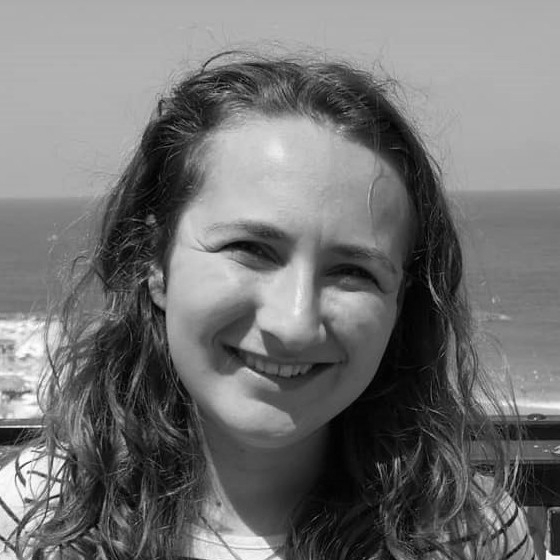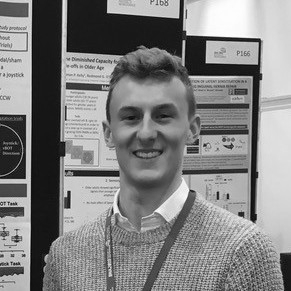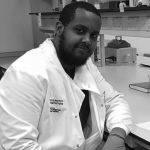Research
Students
2019
PhD students who began projects within the Centre for Musculoskeletal Ageing Research in October 2019:

Peter Dawson
Peter is a PhD candidate supervised by Dr Yu-Chiang Lai in the School of Sport, Exercise and Rehabilitation Sciences with co-supervision by Dr Martin Whitham (University of Birmingham) and Prof Philip Atherton (University of Nottingham). With the research theme of the molecular mechanisms of muscle atrophy, Peter aims to elucidate the role of the ubiquitin-proteasome system (UPS). His current study is on the muscle-specific Ubiquitin E3 Ligase – MuRF1; he has characterised an antibody to detect and enrich MuRF1 and begun to characterise its upstream interacting partners with in-vitro assays. He aims to build a full profile of MuRF1 in-vitro, in-cell, and in-vivo during his PhD with scope to look at other molecular signals in the UPS.
Peter has a BSc (Hons) and an MSc by Research in Sports and Exercise Science from the University of Birmingham, starting his research career with a summer research scholarship (Physiological Society) working on the effect of exercise on pancreatic insulin secretion in cell culture.

Jessica Conway
Jessica graduated from the University of Birmingham in 2018 with a first class BSc (Hons) degree in Biomedical Science, after which she completed a MSc by Research at the university’s Institute of Inflammation and Ageing where she developed an interest in immunology and biogerontology.
Under the supervision of Dr Niharika Duggal, Professor Claudio Mauro, Professor Stephen Harridge and Professor Paul Greenhaff, Jessica will be investigating the potential links between gut microbiome dysbiosis and immunesenescence in older adults to better understand the underlying mechanisms driving immune ageing. Additionally, she is assessing the beneficial effects of lifelong physical activity on microbial dysbiosis and the trajectory of decline in physiological and immunological function with advancing age. Jessica’s research aims to provide new insights into better understanding the ageing process and highlight the impact of lifestyle factors such as diet and physical activity on immune ageing in older adults.
This PhD studentship is a collaborative project between the University of Birmingham’s Institute of Inflammation and Ageing and King’s College London’s Centre for Human and Applied Physiological Sciences.

Matthew Jaconelli
Matthew graduated from the University of Stirling in 2019 with a first class BSc (Hons) degree in Sport and Exercise Science, during which he completed two research summer studentships with The Nutrition Society and The Physiological Society. Throughout his studies, Matthew has focused on the metabolic regulation of skeletal muscle mass within various atrophy models.
During his PhD, Matthew will investigate the role of inflammation and bed-rest following major abdominal surgery on skeletal muscle mass regulation and immune cell function through the use of novel stable isotope tracer techniques. Matthew is based in the School of Life Sciences at the University of Nottingham under the supervision of Dr. Matthew Brook, Professor Paul Greenhaff, Professor Dileep Lobo, Professor Philip Atherton (based at UoN Derby Campus) and Professor Janet Lord (UoB).

Shelby Bollen
Shelby graduated from the University of Reading in 2017 with a BSc (Hons) in Biochemistry before completing an MSc in Musculoskeletal Science at University College London. During her undergraduate degree, Shelby was awarded the Undergraduate Achievement Award by the Society for Endocrinology in recognition of her work. Throughout her studies, Shelby developed a keen interest in the regenerative and endocrine capacities of skeletal muscle.
Under the supervision of Professor Philip Atherton, Professor Martin Hewison, and Dr Daniel Wilkinson, Shelby’s research aims to clarify the relationship between vitamin D and musculoskeletal ageing. Despite the prevalence of vitamin D deficiency being estimated at 1 billion people worldwide, and presenting clinically with muscle pain and weakness, there has been little research into the physiological role of vitamin D within skeletal muscle. Thus, the project will focus primarily on establishing the molecular mechanisms that underlie this link, whilst also exploring whether alterations to genes associated with the vitamin D system have any influences upon an individual’s muscle health and function.

Vincent Gauthier
Vincent graduated from the University of Aix-Marseille in France in 2017, then completed a master’s degree in immunology in the same university in 2019. During his studies he undertook different research projects focusing on Pre-B cell lymphomas and their interactions with stromal cells within the bone morrow. He then had the opportunity to work in the Kennedy Institute of Rheumatology in Oxford, where he focused his research on the role of the stroma in Arthritic disease.
Today, he has now joined the Rheumatology Research Group in the Institute of Inflammation and Ageing in Birmingham as a PhD student under the supervision of Professor Christopher Buckley and Professor Karim Raza. He is investigating the role of cellular senescence in fibroblasts population in rheumatoid arthritis and osteoarthritis. He is also investigating the relationship between macrophage and fibroblast subsets in a disease context.

Sophie Mathewson
Sophie graduated from University of Birmingham with a BSc (Hons) in Sport and Exercise Sciences and then went on to complete a MSc at Kings College London in Human and Applied Physiology. Her MSc thesis looked at cellular senescence in human primary myogenic cells from young and old individuals, and was awarded the Colt Foundation prize for best KCL MSc physiology research project 2019. This project reinforced her interest in muscle research and ageing.
Sophie’s PhD research focusses on care home residents, a largely understudied population in musculoskeletal research despite often being the most frail individuals. She is looking at protein intake and responsiveness in care home residents. She will be determining optimal protein nutrition intake in this population through a novel isotope tracer technique with mass spectrometry analysis, and conducting a feasibility study of assessment parameters viable for use in the care home setting.
Sophie is supervised by Professor Carolyn Greig at the University of Birmingham and Dr Beth Phillips and Dr Adam Gordon from the University of Nottingham

Carly Welch
Dr Carly Welch is a senior registrar in Geriatric Medicine currently completing a PhD within the Institute of Inflammation and Ageing. Her PhD aims to improve our understanding of acute sarcopenia in older people. Carly completed her primary medical degree at the University of Birmingham in 2011 and has worked as a hospital doctor in the West Midlands since then. In 2015, she commenced employment as an NIHR-funded Academic Clinical Fellow (ACF) and Higher Specialist Trainee in Geriatric Medicine and General (Internal Medicine). During her ACF programme, and through observation during her own clinical experience, she developed an interest in changes in muscle quantity and function in hospitalised older adults. She proposed a new concept of acute sarcopenia, which has now been recognised as a distinct condition by the European Working Group in Sarcopenia in Older People 2. Her review article has received 35 citations to date. Conduct of her pilot study enabled her to obtained an MRes (Clinical Research) in 2019 from the University of Birmingham.
Carly is now completing a PhD that aims to fully characterise changes in muscle quantity/quality and function in hospitalised older people. She is supervised by Dr Thomas Jackson, Dr Carolyn Greig, and Professor Tahir Masud. Her PhD will use pragmatic tools to measure the responsiveness of muscle quantity/quality and function within clinical environments, in relation to patient-reported outcome measures for physical function. She will also assess the acceptability of these measures to patients. Alongside this, she will measure serum and plasma markers of immune-endocrine function and systemic inflammation to increase understanding of pathophysiology. She will use her findings to determine how biological and clinical factors can be used to risk stratify patients towards targeted interventions. Her systematic review on interventions to ameliorate changes in muscle quantity and function in hospitalised older adults provides a summary of interventions that have been trialled to date. Carly intends to use the results of her PhD to enable planning of interventional trials in hospitalised older adults.
Publications arising from this PhD:
Welch C, Greig CA, Masud T, Pinkney T & Jackson TA. Protocol for understanding acute sarcopenia: a cohort study to characterise changes in muscle quantity and physical function in older adults following hospitalisation, BMC Geriatrics, 2020, 20(239)
Available at: https://bmcgeriatr.biomedcentral.com/articles/10.1186/s12877-020-01626-4

Joe Taylor
Joe recently graduated from Liverpool John Moores University with a Masters degree in Exercise Physiology. His MSc research project investigated the effects of novel accentuated eccentric resistance training on skeletal muscle characteristics and functional performance in young adults.
For his PhD, Joe will primarily use MRI techniques to investigate the physiological phenotype of frailty. The project aims to identify and compare the physiological characteristics (e.g. structural and functional parameters of the brain, heart and skeletal muscle) of non-frail and frail individuals, to establish a biological basis for the syndrome of frailty. This information will highlight key targets for future interventions and therapeutic treatments aiming to combat frailty development in old age.
Joe is based in the School of Life Sciences at the University of Nottingham and is supervised by Professor Paul Greenhaff, Professor John Gladman and Professor Susan Francis.

Isabelle Aldritt
Isabelle graduated from the University of Bath in 2019 with a BSc (Hons) in Biochemistry. During her degree she spent a year working at the Mass Spectrometry Research Facility at the University of Oxford.
Loss of muscle mass and function as a consequence of ageing (sarcopenia) or disease (cachexia) is associated with increased mortality rates but little is known about the underlying mechanisms of wasting. For her PhD, Isabelle will use metabolomics techniques to identify unique metabolic signatures of musculoskeletal wasting in sarcopenia and cachexia, and to identify potential therapeutic targets involved in the wasting process.
Isabelle is based in the School of Medicine at the University of Nottingham’s Derby campus and is supervised by Dr Daniel Wilkinson, Professor Paul Greenhaff and Professor Warwick Dunn.

Eleanor Jones
Eleanor graduated from King’s College London following completion of a BSc in Biomedical Science and MSc in Human and Applied Physiology. Before starting a PhD, she worked as a research assistant at King’s studying the effects of bed rest on muscle structure and function, and University College London recording animal neural activity.
Eleanor is based in the School of Medicine at the University of Nottingham’s Derby campus. She will be investigating novel interventions to target age-related muscle loss, using intramuscular EMG to specifically focus on changes in motor unit properties with age and exercise training. She is supervised by Dr Mathew Piasecki, Dr Beth Phillips and Dr Shin-Yi Chiou (UoB).

Sam Heaselgrave
Sam is a PhD student supervised by Professor Gareth Lavery at the University of Birmingham and co-supervised by Professor Kostas Tsintzas at the University of Nottingham. Sam’s research focuses on the interactions between glucocorticoid hormones and NAD+ metabolism. The aim of his project is to idenfity these interactions and then determine whether these change as we age in order to inform the development of therapeutic measures that promote healthy ageing. Sam works with in vitro cell models as well as in vivo mouse models and humans.
Prior to starting his PhD Sam completed a BSc and MSc by research in Sport and Exercise Sciences at the University of Birmingham. During this time, he first entered research, publishing his first paper in 2019 entitled Dose-response relationship of weekly resistance-training volume and frequency on muscular adaptations in trained men. Sam brings an applied appreciation to his research practice, having worked outside of academia for both Tennis Australia and West Bromwich Albion FC in applied sport science positions.

Hannah-Jade Parker
Hannah-Jade Parker graduated from Bath Spa University with a BSc (Hons) in Human Biology. She then completed an MSc at the University of Bath, which was partially funded by the Hilda Martindale Trust, with her dissertation focusing on the Hippo Signalling Pathway in Squamous Cell Carcinoma. Hannah then took a year away from academia to work in a Cambridge-based Biotech, focusing on the use of bispecific antibodies in immuno-oncology.
Hannah is now based at the University of Birmingham where her research focuses on extracellular vesicle (EV) mediated cross talk in exercise and ageing. Specifically, she will be investigating the roles of these extracellular vesicles in signalling within different physiological and pathological contexts within the remit of ageing. This project will adopt cutting edge techniques in mass spectrometry and nanoparticle analysis to examine this EV cross talk during exercise in aged populations. This work will be completed in collaboration with the University of Melbourne, Australia.
Hannah is based in the School of Sport, Exercise and Rehabilitation Sciences at the University of Birmingham and is supervised by Dr. Martin Whitham and Dr. Leigh Breen.

Salih Kucuk
Salih graduated with BSc (Hons.) in Medical genetics from Queen Mary University of London in 2017 and followed this with an MSc in molecular medicine from Imperial College in 2018.
For his PhD, Salih is studying the role of metabolic-epigenetic in the control of obesity-induced inflammageing and its impact on skeletal muscle and joint pathology. Salih aims to test the hypothesis that obesity and a diet high in saturated fatty acids cause a long-term reconfiguration of the epigenome of CD4+ T cells leading to a harmful inflammatory response. Additionally, he will investigate the anti-inflammatory potential of Omega-3 on the obesity-induced inflammation. In the longer term, Salih would like to dissect the mechanistic control of obesity-induced inflammation by identifying the key genes and bioactive fatty acids in the process.
Salih is currently based in the Institute of Inflammation and Ageing at the University of Birmingham and supervised by Professor Claudio Mauro, Dr Jennifer Niven and Dr Jorge Caamano.
2018
Ten PhD students began projects within CMAR in October 2018:

Tom Inns
Tom graduated from the University of Nottingham in 2018, completing a degree in Medical Physiology and Therapeutics with foundation studies. His dissertation research involved body-weight high-intensity interval training in young adults and this research was displayed at Europhysiology 2018 as a poster presentation.
Tom is based in the School of Medicine at the University of Nottingham’s Derby campus. He is investigating age-related differences in disuse atrophy following differing lengths of immobilisation, with an aim to gain a clearer picture of the time frame of disuse atrophy as a physiological process within young and old populations. In addition to this, Tom has been investigating protocols of neuromuscular electrical stimulation and fatigue, with this research being presented at Physiology 2019 in Aberdeen and Future Physiology 2020 as an ePoster online

Ryan Marshall
Ryan is a PhD student in Human Metabolic Physiology within the School of Sport, Exercise and Rehabilitation Sciences at The University of Birmingham. His PhD project is titled; ‘Exercise and Nutritional Strategies to Maintain Human Skeletal Muscle Mass and Metabolic Function During Ageing, Inactivity and Disuse’. Ryan has a particular interest in stable isotope tracer methodologies, specifically the oral tracer deuterium oxide (D2O), and how the application of this method can be used to measure changes in protein metabolic flux within skeletal muscle. Furthermore, a primary focus of Ryan’s projects are to determine the acute and chronic changes in muscle protein synthesis during ageing, and how periods of transient inactivity exacerbate ‘anabolic resistance’ and accelerate the loss of skeletal muscle mass and metabolic function. Moreover, Ryan has a keen interest in cellular metabolism and determining how ageing per se augments a precipitous decline in skeletal muscle mitochondrial function and respiratory capacity.
Ryan is supervised by Dr. Leigh Breen (Associate Professor of Metabolic and Molecular Physiology) at The University of Birmingham and co-supervised by Dr. Daniel Wilkinson (Assistant Professor of Physiology and Biochemistry) at The University of Nottingham.
Publications:
• Marshall, R.N., Smeuninx, B., Morgan, P.T. and Breen, L., 2020. Nutritional Strategies to Offset Disuse-Induced Skeletal Muscle Atrophy and Anabolic Resistance in Older Adults: From Whole-Foods to Isolated Ingredients. Nutrients, 12(5), p.1533.
• Marshall, R.N., Morgan, P.T., Martinez-Valdez, E. and Breen, L., 2020. Quadriceps muscle electromyography activity during physical activities and resistance exercise modes in younger and older adults. Experimental Gerontology, p.110965.

Daniel McCormick
Daniel McCormick is an accredited biomedical science graduate with previous research experience in cardiac and skeletal muscle physiology. He is studying skeletal muscle motor unit plasticity as a function of ageing, inactivity, and disease. The research will investigate the electrophysiological and molecular measures of neuromuscular function following various interventions such as muscle training, disuse, and acute damage. The project will utilise state of the art MRI technology available at the SPMIC and develop the latest iEMG techniques. The primary aim of the project is to provide mechanistic insight into the relative contribution of fiber loss and atrophy to total muscle loss, which will inform functional outcomes for patients.
The studentship is funded jointly by our Centre and the Nottingham NIHR Biomedical Research Centre (BRC) and is supervised by Dr Mathew Piasecki, Professor Philip Atherton, Professor Paul Greenhaff and Professor John Gladman.

Andrew Wilhelmson
Andrew graduated from the University of Gloucestershire with a BSc (Hons) in Sport and Exercise Sciences, before completing an MRes at the University of Nottingham which investigated the impact of chronic high-intensity interval training on postprandial metabolism. Andrew then took some time out from academia before returning to Nottingham for this collaborative PhD project with the Nestlé Nutrition Institute.
Andrews project aims to better understand the relationship between myostatin (a protein primarily produced and secreted from skeletal muscle cells, that is known to negatively regulate muscle growth) and insulin resistance in lean and obese muscle cells. To that end, he will identify novel candidate mediators of myostatin expression that might be potential targets for therapeutic intervention; study the effects of novel nutritional compounds on myostatin expression/activity; determine if novel regulators of myostatin expression are differentially expressed in obese muscle, following contractile activity; and whether novel nutritional compounds can help muscle from the obese behave more like muscle from lean individuals, with regards to myostatin and insulin sensitivity.

Rosemary Nicholas
Rosemary Nicholas will be using MRI to elucidate the importance of physical activity to brain health and motor function in ageing. She will be using exercise conducted in the scanner to examine differences in cardiac and brain structure and function in elderly people who are lifelong exercisers and those that are sedentary to isolate changes due to ageing from those due to inactivity.
She graduated with a BSc in Neuroscience from the University of St Andrews, and an MSc in Cognitive Neuroscience from the University of York before working in the Center for Neurodevelopmental and Imaging Research at the Kennedy Krieger Institute.
Rosemary is supervised by Sue Francis and Paul Greenhaff and based in the Sir Peter Mansfield Imaging Centre and the David Greenfield Human Physiology Unit, University of Nottingham.

Matthew Weightman
Matthew completed both his BSc and MSc (by Research) at The University of Birmingham, specialising in sensorimotor neuroscience.
For his PhD, Matthew is investigating the use of non-invasive brain stimulation to enhance and/or ameliorate aspects of motor adaptation and function in both healthy young and ageing populations. A gradual decline in motor function is an inevitable consequence of increasing age, however, research has shown this deterioration is not permanent and can be improved via brain-stimulation and specific motor training. Matthew’s research will focus on understanding how specific stimulation techniques can be best applied; using knowledge of brain structure, function and mechanisms of neural plasticity. Given the promise for non-invasive brain stimulation to be used as an adjunct therapy, Matthew is interested in translating his findings into certain age-related disease states – such as stroke – which often cause severe motor deficits. See his recently published work for more information about his PhD:
• Weightman, M., Brittain, J. S., Punt, D., Miall, R. C., & Jenkinson, N. (2020). Targeted tDCS selectively improves motor adaptation with the proximal and distal upper limb. Brain Stimulation.
Matthew is supervised by Dr Ned Jenkinson, Professor Chris Miall and Dr John-Stuart Brittain and is based in the School of Sport, Exercise & Rehabilitation Sciences.

Sophia Brady
Sophia is researching “Sedentary behaviour and physical activity interventions for people living with Rheumatoid Arthritis”. Physical activity is recommended in Rheumatoid Arthritis for its anti-inflammatory and cardio-protective effects, whilst sedentary behaviour may exacerbate inflammation and disease progression. The aim of Sophia’s project is to research how physical activity and sedentary behaviours affect multiple disease outcomes in Rheumatoid Arthritis patients and develop interventions to improve these outcomes.
Sophia graduated from the University of Birmingham with a first class degree in Medical Science in 2016 where she specialised in sedentary behaviour and inflammation research.
Sophia is based in the School of Sport, Exercise and Rehabilitation Sciences at the University of Birmingham and is supervised by Dr Sally Fenton and Dr Jet Veldhuijzen van Zanten.

Jonathan Lewis
Jonathan recently graduated from the University of Birmingham with a degree in Biomedical Science. Using this experience he has now joined the Rheumatology Research Group in the Institute of Inflammation and Ageing, undertaking a PhD supervised by Dr Helen McGettrick, Dr Amy Naylor and Dr James Edwards.
Through my research, I aim to explore how a new agent (Pro-B1) changes the actions of osteoclasts (bone eaters) and osteoblasts (bone formers). Both cell types express proteins linked to Pro-B1 activity, and previously Pro-B1 has been found to resolve bone damage. This research will allow us to understand how Pro-B1 works to restore bone, leading to its possible use for treatment of age-related bone damage or bone diseases such as osteoporosis.

Georgiana Neag
Georgiana is a trained human biologist with previous research experience in microcirculation-related complications in the post myocardial infarction heart in ageing. She obtained her BSc in Human Biology at the University of Worcester before joining the University of Birmingham for a Master Degree in Cardiovascular Science. Before starting her PhD, Georgiana collaborated with Moor Instruments to test and optimise the use of a Laser Speckle Contrast Imager to monitor the spatio-temporal aspects of blood flow in the ischemic heart.
Under the supervision of Dr Amy Naylor and Dr Simon Jones at the University of Birmingham and Dr Anjali Kusumbe at the Kennedy Institute of Rheumatology in Oxford, Georgiana will investigate a novel therapeutic pathway and its feasibility of implementation to prevent bone loss in ageing. To achieve this objective the project will investigate the interaction between a group of proteins that act as glue connecting osteoblasts (cells regulating bone formation) to the cells of the vasculature. Data obtained from this project will help gain a better understanding of the role played by these proteins in bone tissue replenishing. This work seeks to identify novel and much-needed means to influence bone deposition for protection against age-related bone disease

Hussein Farah
Hussein graduated with a first class degree in Biological Sciences specialising in Physiology with Pharmacology at the University of Leicester. He spent time working with Professor Nicholas Brindle identifying novel ligands of the Tie2 receptor tyrosine kinase and their role in modulating the activity of the Tie2 receptor.
Osteoarthritis is a painful joint condition and one of the leading causes of pain and disability worldwide. Importantly, despite historically being seen as a “wear and tear” disease of the cartilage there is now evidence that inflammation of the synovial joint lining plays a key role in the disease pathology. A major risk factor for developing osteoarthritis is obesity which may be intricately linked with the inflammatory state observed in osteoarthritis. Hussein is currently researching whether metabolic reprogramming underpins the inflammatory phenotype of the obese osteoarthritic synovial fibroblast.
Hussein is based in the Institute of Inflammation and Ageing at the University of Birmingham and is supervised by Dr Simon Jones, Dr Claudio Mauro, Dr Stephen Young, Dr Mandy Peffers and Dr Lisa Chakrabarti.
2014
Five PhD students began projects within CMAR in 2014:

Stephen Ashcroft
Stephens PhD looked at ‘Determining the muscle anabolic and anti-catabolic potential of Ursolic Acid in Ageing’. Ursolic acid, an apple-derived nutrient, has been shown to increase muscle mass and reduce muscle wasting in mice. However, no studies have been performed in humans. He looked at whether ursolic acid is adequately digested and absorbed in humans and whether it has any influence on skeletal muscle mass and function.
During his time at the University of Birmingham, he was supervised by both Dr Andrew Philp and Dr Phil Atherton. Upon completion Stephen went on to become a Post Doctoral Research Associate at the University of Copenhagen.

Archontissa Kanavaki
Archontissa Kanavaki’s researched the ‘Determinants and Implications of Physical Activity in People living with Hip or Knee Osteoarthritis: An integrated approach’. This work applied various methods to advance understanding of physical activity (PA) determinants in people living with hip and knee osteoarthritis. A systematic review of qualitative evidence on PA barriers and facilitators revealed a complex interplay among physical, psychological, social and environmental factors. These key factors were then assessed quantitatively alongside accelerometer-measured PA. The implications of different PA intensity cut points and ways of PA accumulation were examined, which revealed that regardless of cut points used, bouted moderate-to-vigorous PA is more relevant to health and well-being outcomes than total MVPA in this population. Drawing from the Social-Cognitive and Ecological Theories of behaviour, an integrated path model of self-efficacy and proximity of facilities predicting MVPA (bouted, total) and in turn physical function and quality of life was tested. The model again supported the relevance of bouted, but not total MVPA to better outcomes. Lastly, a qualitative inquiry into peoples’ daily PA and sedentary experiences showed that these experiences were multifaceted. PA/sedentary behaviours were the outcome of a dynamic negotiation between the burden of OA, the need to keep mobile/enjoying life, and one’s life context. Overall the findings suggest potential PA determinants to target and outcomes to consider in future interventions. .
Archontissa was based in the School of Sport, Exercise, and Rehabilitation Sciences, at the University of Birmingham, and was supervised by Professor Joan Duda, Dr Sally Fenton, Dr Rainer Klocke and Dr Alison Rushton. Archontissa is currently a Post Doctoral Research Associate with the Leicester Kidney Lifestyle Team at University Hospitals of Leicester NHS Trust.
Existing publications:
• Kanavaki, A.M., Rushton, A., Efstathiou, N., Alrushud, A., Klocke, R., Abhishek, A., Duda, J.L (2017). Barriers and facilitators of physical activity in knee and hip osteoarthritis: a systematic review of qualitative evidence. BMJ Open, 7(12).
• Kanavaki, A.M., Rushton, A., Klocke, R., Abhishek, A., Duda, J.L. (2016). Barriers and facilitators to physical activity in people with hip or knee osteoarthritis: Protocol for a systematic review of qualitative evidence. BMJ Open, 6(11).

Sam Jones
Sam researched ‘The effect of physical exercise on neurocognitive functions of the young and ageing brain’. Human beings rely on many senses (vision, hearing, touch etc.) to interpret the world around them. We often need to combine information from two or more of these to improve our understanding of an event or situation – watching a person’s lips move can make it easier to hear what they are saying in a noisy room, for example. Sam’s research aimed to investigate how this process of multisensory integration changes as we age and whether any changes may be moderated by physical exercise. Read more about Sams PhD research in the following two publications:
- Noppeney, U., Jones, S. A., Rohe, T., & Ferrari, A. (2018). See what you hear – How the brain forms representations across the senses. Neuroforum 24(4).
- Jones, S. A., Beierholm, U. R., & Noppeney, U. (2019). Older adults sacrifice response speed to preserve multisensory integration performance. (Under revision)
Sam was based in the School of Psychology at the University of Birmingham and is supervised by Professor Uta Noppeney, Professor Penny Gowland, and Dr Susan Francis. Since graduating, Sam has gone on to work at Staffordshire University as a Lecturer in Psychology

Stuart Mackenzie
Stuart Mackenzie Investigated the ‘Vestibular control of balance in older adults at high risk of falling’. The control of balance involves the integration of multiple sensory systems such as vision, proprioception and the vestibular system. As we age and during certain diseased states these systems become damaged and this increases the risk of falling. The vestibular system is often referred to as the balance organs. Stuart investigated the extent to which instability, in high-risk populations, is due to the impaired ability to utilise vestibular information versus the direct effect of the impaired sensory system. Read more about his research findings in the following two peer-reviewed papers:
- Mackenzie SW, Reynolds RF. Differential effects of vision upon the accuracy and precision of vestibular-evoked balance responses. J Physiol. 2018 Mar 23. doi: 10.1113/JP275645. [Epub ahead of print] PubMed PMID: 29572826.
- Mackenzie SW, Reynolds RF. Ocular torsion responses to sinusoidal electrical vestibular stimulation. J Neurosci Methods. 2018 Jan 15;294:116-121. doi: 10.1016/j.jneumeth.2017.11.012. Epub 2017 Nov 21. PubMed PMID: 29170018; PubMed Central PMCID: PMC5786448.
Stuart was supervised by Dr Raymond Reynolds, Dr Urmila Tandon and Mr Richard Irving. Since the completion and submission of his PhD thesis, Stuart has been appointed as a Postdoctoral Research Associate position November at Burke Neurological Institute (formerly known as the Burke Medical Research Institute) in New York.

Daisy Wilson
Daisy Wilson completed a Clinical PhD on ‘Impaired pAkt regulation in muscle and immune cells: Targeting a shared mechanism in sarcopenia and immunesenescence’ Daisy was supervised by Professor Janet Lord and Dr Elizabeth Sapey.
During her time as a clinical PhD student, Daisy won both a scientific prize for her a poster on neutrophil dysfunction in frailty at the British Geriatrics Society (BGS) and the Jed Rowe prize for her work on frailty by the West Midlands Geriatrics Training Committee.
Daisy is currently an Academic Clinical Lecturer at the University of Birmingham.
2013

Andrew Hale
Andrew graduated from the University of Nottingham in 2013 with a degree in Physics with Medical Physics, and has since gone on to combine his interests in both physics and physiology. Andrew’s primary research focus was in developing magnetic resonance (MR) techniques to quantify the cortical vascular response to exercise in young and old volunteers and to assess the impact of chronic exercise training. He also researched the link between physical activity and muscle quality and function, with a particular interest in studying whether brain tissue can benefit from exercise in a similar way to muscle tissue.
Graduating in 2017, Andrew was supervised by Professor Paul Greenhaff and Professor Susan Francis. He went on to secure a post in Industry at an IT Business Management and Technical Consultancy

Nick Kitchen
Nick Kitchen’s research focused on investigating how sensory adaptations with age are associated with motor performance, or more specifically, how they might be targeted in individualized training paradigms to promote motor recovery of the upper limb. He used a 2D planar robotic manipulandum to develop a method of assessing upper limb proprioceptive acuity which can be used in the future to investigate causal relationships between proprioceptive loss and age-related motor impairments of the upper limb.
Nick who was supervised by Professor Chris Miall and Professor Alan Wing, is now a Postdoctoral Research Associate in the Department of Speech and Hearing Sciences at the University of Washington, Seattle.

Mhairi Macfayden
Mhairi Macfadyen’s research aims were to validate the use of commercial pigs as an animal model for musculoskeletal ageing and osteoarthritis. Current animal models do not closely reflect the processes seen in human ageing; this research aimed to establish how the muscle and joints of commercial pigs age to determine if these pigs would be a more appropriate animal model for musculoskeletal research.
Mhairi was based at the University of Nottingham and was supervised by Dr Andrew Murton and Dr Simon Jones. Mhairi is currently employed as a Medical Writer.

Danielle Thomas
Danielle graduated with a BA in Biological Sciences from Magdalen College, the University of Oxford in 2011 and followed this with an MSc in Applied Sport and Exercise Nutrition from Oxford Brookes University in 2013.
Danielle researched nutritional and exercise interventions to preserve and increase muscle mass and function in adults aged over 70 years, with the aim of reducing the impact of sarcopenia. Her main objective was to consider a resistance exercise training programme in combination with protein supplementation and to study the effects of altering the timing and distribution of protein ingestion throughout the day.
Danielle was supervised by Professor Carolyn Greig, Professor Philip Atherton, Professor Ken Smith and Dr Alison Rushton. Since graduation Danielle has worked in Research Support as a Research Facilitator at the University of Birmingham.

Yasir Elhassan
Yasir joined the Centre as a Clinical Research Fellow and he spent 2 years ‘Investigating novel nutritional approaches to improve skeletal muscle metabolic function in humans’. Based in the Centre for Endocrinology, Diabetes and Metabolism (CEDAM), at the University of Birmingham, he was supervised by Dr Gareth Lavery, Dr Andrew Philp, Professor Wiebke Arlt.
Yasir is currently an Academic Clinical Lecturer at the University of Birmingham.